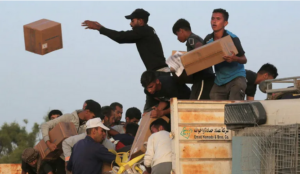Palestinian sources are making it clear that no Israel-backed local entity can govern Gaza

Palestinians with aid packages in central Gaza, 18 May 2024
Jack Khoury writes in Haaretz on 19 May 19 2024:
Fearing full Israeli military rule over the Gaza Strip, the Palestinians have also been discussing who will control the enclave after the war. Unlike Israel, though, Gazans oppose the idea of local entities governing the area under Israeli patronage, and are pinning their hopes onto an alternative: the creation of a multinational force managing civilian affairs for a limited period, followed by a diplomatic process ultimately resulting in a Palestinian state.
Reports on Friday said that Prime Minister Benjamin Netanyahu had expressed willingness to discuss transferring civilian control of Gaza to “local entities unaffiliated with Hamas.” But prominent figures in Gaza who are unaffiliated with the organization are clear in their opinion that under the circumstances, no one would agree to govern Gaza under Israeli patronage or be able to establish order or get any cooperation from Gazans.
A prominent individual in Gaza says the events of the past few weeks demonstrate that Hamas is still the dominant and most influential entity in Gaza. If Hamas doesn’t give the green light to a decision, he says, it’s unlikely that anyone would be able to rule Gaza – including traders and clan leaders, suggested by some as potential sources of political leadership. These groups won’t provide leaders with popular legitimacy or impose order in Gaza, he adds.
“Anyone who dares to undertake the mission will be a contractor who cannot withstand pressure at best or under Israeli patronage at worst,” he says. “They will therefore not obtain the cooperation of the Palestinian factions, including the Palestinian Authority and its agencies, and certainly not Hamas.”
A veteran Fatah activist in Gaza says that the perspective there was fundamentally different from that in Israel. He says that Gaza’s powerful family clan leaders and mukhtars, who have been mentioned as ostensibly being able to assume power, are affiliated with Palestinian factions. “What are factions?” he asks. “[The clan leaders] are people who ultimately live in Gaza, one from this family and one from another, and each family is affiliated with one of the factions: usually Hamas, Islamic Jihad, Fatah, or any other faction, and anyone who tries to separate them is deceiving the Israeli public.”
The activist says there have been attempts in recent weeks to contact well-known figures in Gaza or Gazans who left at the start of or before the war. They were offered various positions in Gaza under Israeli patronage but rejected the proposals out of fear of the consequences, he adds.
The Palestinian Authority also refuses to cooperate in the administration of Gaza, rejecting out of hand a proposal to control the Rafah border crossing under Israeli patronage. A senior PA official told Haaretz that Ramallah understands the system in the West Bank won’t work in Gaza.
“From the Palestinian perspective, there is nothing good about the West Bank model,” he says. “Just ask any Palestinian in the West Bank and he will say it in the clearest terms. For the Palestinians, the West Bank is occupied, and the Palestinian Authority is faltering. How can we talk about applying the West Bank model to Gaza when the PA’s standing has eroded to the point of loss of control and inability to pay salaries? Add to that the fact that Hamas and the other factions in Gaza would not agree to cooperation with this measure.”
The factions and clan leaders in Gaza, as well as senior PA officials in Ramallah, agree on the eventual solution: placing a UN-sponsored multinational force in Gaza for a limited time until a diplomatic process is launched that implements the two-state solution based on a resolution made at an Arab League summit last week. According to a Palestinian source familiar with talks on the summit’s sidelines, Arab states have agreed to participate in such a force as a stepping stone to a governing body in Gaza created by a Palestinian consensus.
The source says Arab states would not be willing to give the PA a financial safety net or provide direct support, indicating that they have no confidence in the new Palestinian government led Prime Minister Mohammad Mustafa, arranged by President Mahmoud Abbas. Supporters of the process proposed at the summit say the new governing body drawn from the multinational force would have the support of the Palestinians and Arab states.
Meanwhile, sources say that they have seen attempts by Palestinian factions and unaffiliated Palestinian entities to draw up a long-term plan. The plan would begin with a cease-fire in Gaza, an Israeli withdrawal, and the release of prisoners and end with laying the groundwork for the establishment of a Palestinian state.
Should the plan mature and win international support, it would be possible to make progress toward a Palestinian governing body administering both Gaza and the West Bank. Sources familiar with the talks say that such a government would have to gain Palestinian popular legitimacy through elections or a resolution by a national council in which all the factions have representation.
This article is reproduced in its entirety
